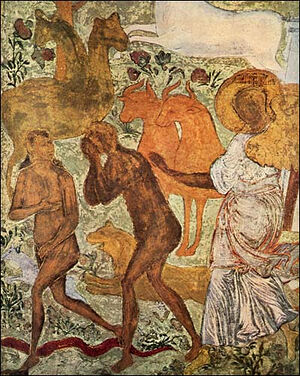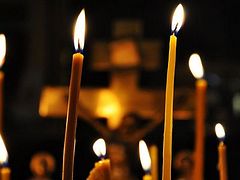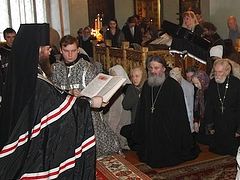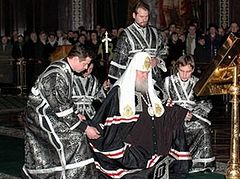 Expulsion of Adam and Eve. Fresco in Church of John The Baptist in Rotshenie, Russia Brethren, we find ourselves on the eve of Great Lent. This is the Sunday of Forgiveness, otherwise known as Cheesefare Sunday. Tomorrow, Clean Monday, we embark on the journey that is the Great Fast. If last Sunday, the Sunday of the Last Judgment, we commemorated the end of history, this Sunday, we commemorate an event intimately connected with history’s inception. And that event is the Fall of Adam and Eve, their expulsion from Paradise. Having become victims of sin, and victims of the devil and death by desiring to assume for themselves that which belonged solely to God—having desired to become gods themselves—our first parents were deceived; they were returned to the earth from which they were created, and exiled to a land barren and untrodden and unwatered. And they sat across from Eden, as we hear in one of the beautiful hymns composed by the Fathers for this day—a hymn written in Adam’s voice—and lamented what seemed to them their eternal predicament.
Expulsion of Adam and Eve. Fresco in Church of John The Baptist in Rotshenie, Russia Brethren, we find ourselves on the eve of Great Lent. This is the Sunday of Forgiveness, otherwise known as Cheesefare Sunday. Tomorrow, Clean Monday, we embark on the journey that is the Great Fast. If last Sunday, the Sunday of the Last Judgment, we commemorated the end of history, this Sunday, we commemorate an event intimately connected with history’s inception. And that event is the Fall of Adam and Eve, their expulsion from Paradise. Having become victims of sin, and victims of the devil and death by desiring to assume for themselves that which belonged solely to God—having desired to become gods themselves—our first parents were deceived; they were returned to the earth from which they were created, and exiled to a land barren and untrodden and unwatered. And they sat across from Eden, as we hear in one of the beautiful hymns composed by the Fathers for this day—a hymn written in Adam’s voice—and lamented what seemed to them their eternal predicament.
Adam and Eve listened to the Serpent’s poison and this, combined with their idle curiosity—the desire to know the unknowable—ate at them. And how many of our own sins and passions began in such a fashion? We desired something, we felt something lacking within. There was a void in us, a chasm. The passions create a void in man, they make the heart a desert, and instead of running to the Lord for the water we make the terrible mistake of listening to the serpent, who instead deceives us into mistaking sand for water. Does not that same noetic serpent not nag and not gnash at our interior consciousness, does he not whisper into the secret places of our heart that we are powerful, that we are knowledgeable, that we are immortal, indestructible? Has he not convinced us to become co-conspirators with the world—that is everything opposed to Christ—and all the evil that is in the world to obstruct the divine will of the Savior? Have we at no time furthered his agenda, that is, the dominion of sin and desolation?
Our Savior admonishes us in the Gospel we heard today that the pre-requisite to our re-inheriting the divine life we lost through our First Parent’s transgression is Forgiveness. Why is this so? Christ Himself is the reconciliation, the “Forgiveness” between God and Man. He brings reconciliation between heaven and earth. We, sinners and prodigals, have been baptized into Christ and commune of His precious Body and Blood at each Liturgy. We are therefore members of Christ and members of one another, in the words of the Holy Apostle Paul. And to each of us gifts are given. All this we mentioned last week and we will not reiterate it in detail here—except to say that the gifts we are given by the Holy Spirit must be multiplied. And how can they be multiplied if we do not imitate Christ?
How can we claim to be Christians if we do not live out the Gospel, which is simply Christ’s life, His work, His miracles, His Passion, His Crucifixion, His Resurrection? Christians must live the Gospel, Christians must live Christ’s life! And if Christ fasted too, we must by holy obligation obey the Holy Church—and zealously keep the divinely appointed Lenten Fast. And if Christ revealed that the Heavenly Father commands us to forgive men their trespasses, we should also in all charity generously forgive. Christ does not force us to forgive—He says if we forgive. This forgiveness must resonate from our own free will.
Forgiveness is the royal virtue. Great Saints were made by Forgiveness. Saint Dionysius, Bishop of Aegina who was from Zakinthos, from the Sigoúros family—a family of Zakinthian landed gentry having a long-standing blood feud with another wealthy family—the Mondínos. All this is confirmed by the historical records of the Venetian Republic kept today in Venice. The saint’s brother, Konstantís, was killed by a man belonging to the Mondínos family. The murderer sought refuge from the Venetian authorities at the Strofádes Monastery—a remote Monastery on Zakinthos to which the saint had retired after his episcopacy on Aegina.
Saint Dionysius opened the Monastery’s portal at midnight to find a man whose overcoat and hands were drenched in blood, and who, in an anxious panic, informed the saint that he had killed a man belonging to the Sigoúros clan named Konstantís and that the Sigoúros clan was not more than a few miles away. Imagine the pain and the turmoil, the storm in the saint’s heart. Now see how the Lord reigns in the heart’s of the saints: The saint realized he had before him a murderer who not a few hours prior murdered his very brother. Not only did the Saint give this man sanctuary, but he also smuggled him to Venice.
Behold, how St. Dionysius lived Christ’s words that we heard by showing us the highest example of Christian living—unconditional Forgiveness. The saint embodied the Lord’s words we heard: “Where your treasure will be, there will your heart be also.” The saint’s treasure—his heart—was invested not in vanity or in envy or avarice but in mercy and forgiveness. The saint’s treasure was living the Gospel of Christ. The saint’s treasure was not his earthly family’s vainglory, “righteousness” or vengeance. The saint participated Christ’s glory and the fulfillment of Christ’s righteousness in mercy and forgiveness. The saint counted himself and his brother’s murderer as kindred family, for he saw his brother’s murderer through Christ’s eyes and with Christ’s heart. The saint in this instant built for himself a mansion in the heavens with the invaluable treasure of his sanctified heart.
This was, however, not the case for another man, a certain priest in the early third century who was on his way to martyrdom. This priest had a very good friend, and it so happened that some days prior to his capture, the priest and his friend had a falling out. As he was on his way to martyrdom, the priest’s friend ran and asked him for his forgiveness—not once but multiple times, from the prison to the stadium. The soon-to-be-martyred priest would not relent. He would not even condescend to glance at his former friend! And when, at the last moment before the Roman executioner was to decapitate him, a Roman official asked him if he would “respect” his age and “reconcile” with the “ancestral gods” by simply offering a pinch of incense—then, this priest stood up and proclaimed before the stadium that he was in a troubled state of mind and regretted not offering this sacrifice to the “true gods” earlier. The Lord had withdrawn from him suddenly and unexpectedly the grace to endure sufferings and martyrdom for His Name’s sake because He did not forgive.
Now, as we are before the gate of Great Lent, let us be reconciled with God and men. The Lenten season the season of the virtues, the stadium of restraint and circumspection is at hand. Adam and Eve fell from pride, therefore let us heed the call to humility. Adam and Eve fell from gluttony; therefore let us observe the Holy Fast. Let us not fast only from foods, but also from passions, from envy, from anger, from deceit, from maliciousness. The act of anointing the head and washing the face commanded by the Lord in today’s Gospel as a prerequisite of proper fasting is this: to anoint the soul with the Holy Spirit unto the increase of virtue, to avoid evil, contaminating thoughts and dispositions and actions. According to St. Nikolai (Velimirovic) of Zicha we must: “Allow the Holy Spirit the possibility to sow the field of the heart with all species of divine and God-pleasing grains and heavenly flowers.” Let us keep this thought before us as we enter the Lenten Fast.
If Lent is an arena then we are in a battle. We must arm ourselves with the weapons of light as the Apostle Paul taught us; we must guard the senses, we must keep vigil over our mind’s inclinations, over the thoughts. Curiosity led Adam to the Fall, so let us cut down this passion as one passion feeds the other. Should we look at something that will lead us to sin? Let us avoid that and gaze only at what is righteous and pure. Should we say something that will destroy our brethren? Let us fast from idle talk and boastful statements. Instead let us speak the truth, let us nurture the weak and the faint-hearted as the Apostle instructs, let us speak of Christ—but in the concurrent knowledge that the doers and not the sayers will be justified. Should we fill the interior life of our soul via the ears with pollution, with gossip, with terrible music, or blasphemy? Let us listen to things profitable, righteous things, godly things, admirable things. Let us mediate on these things and let us cultivate them in the beautiful garden, which is the soul. According to the aforementioned St. Nikolai:
Through the body the soul shows itself to this world. For God, a man’s face is his soul, but for the world a man’s face is his body. With the help of bodily senses and organs we show the world what we think, feel, and want. The tongue says what the mind thinks; the eyes reflect what the heart feels; the hands and feet bring to pass what the will of the soul wants. Cleanse your body from committing any kind of sin, any impurity and any evil. Restrain your feelings from everything intemperate and destructive. Direct your whole body that it might be a true temple for your soul—not an inn yard on a broad highway, where thieves go to divide their spoils and make plans for new raid— but a temple of the living God.
Here, we have the supreme definition of how we must live the Lenten Fast. This is the true fast that emboldens the soul before God and before sin. This is the true fast Christ practiced—not the false, hypocritical, dietary, on-display-for-society fast that the Pharisees championed. And this is the fast by which the Ninevites were reconciled with God, by which Moses obtained the commandments, by which Elijah closed the heavens, by which Daniel and the Three Youths stopped the mouths of lion’s and quenched the strength of fire, and by which John prepared the world for the advent of the Lamb of God.
The Saints lived Christ’s life, so let us imitate the Saints who became living gospels. Great saints forgave great sins; can we not forgive the minor inconveniences we inflict on each other? Great saints labored in the deserts during the Great Fast, not eating bread nor drinking water except on Saturdays and Sundays. In this time of abundance never seen before in the world, can we not observe the fasting rules as prescribed by the church for our salvation? Those who are seriously ill or elderly have a valid excuse not to fast; but let us be honest: This is not the case for the majority. Today, parents make excuses for their children to not observe the Lenten fast and so they participate in the degradation of Great Lent. Especially now, with most children being at home due to the Covid-19 pandemic, the excuses have well run out in this area.
The fast must be observed and there are plenty of resources online to do so in such a manner that barely deprives us. Let us strive to do the minimum at least. Fasting from foods, let us increase prayer. Can we commit to reading some of Great Compline each night as a family before the holy icons? Can we commit to reading the prayer of St. Ephraim collectively in the mornings? Can we attend the Liturgy of the Presanctified Gifts to commune during the Lenten days? Can we attend the Saturday morning Liturgy wherein we will bring a small plate of kóliva for our departed loved ones? Our loved ones feel our prayers and they require them, are we mindful of this? Will we unfailingly read one chapter of the gospel each day as a family to walk with Christ through the desert of the Lenten Fast? Let us provoke ourselves to a higher standard of Christian living during this Great Lent. Let us challenge our souls to “arise from that slumber”, as we hear in the Great Canon each night in this first week of Lent.
One of the last “harbors” the ship of the Church will sail to as we approach Holy Pascha is named “Holy Tuesday”. On that night we will hear how Christ will award those who are vigilant, those who multiplied the talents, those who fasted, those who increased virtue and prayer and alms giving and forgiveness: Christ the Bridegroom will give an ultimate gift, a supreme gift, an immaterial, invaluable gift to them: “life incorruptible” beginning on the night of Pascha and culminating in the age to come.



